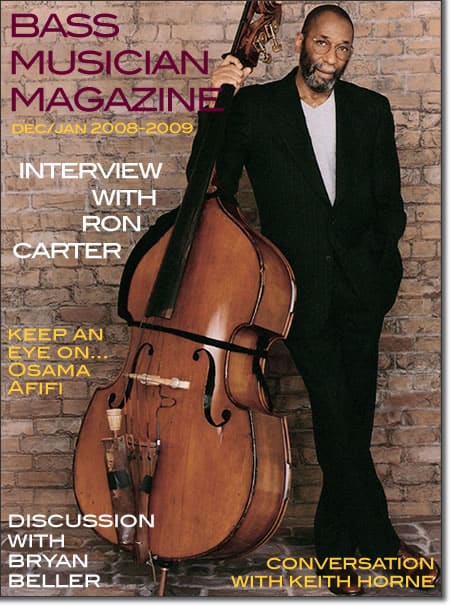Cover
Bass Musician Magazine Featuring Ron Carter / Dec08-Jan09 Issue

Interview with Bassist Ron Carter –
There will be few if any readers that don’t know the name Ron Carter. If you went to Webster’s dictionary and looked up the definition of “icon”, he would probably be listed. This was my first time talking to Ron and he made me feel like we’d known each other for years, but I’m sure musicians that played with him for the first time got that same feeling musically with the virtuosity he radiates.

To “make a difference” in a musical genre for such an extended period of time would be in my opinion a one liner that any musician would be privileged to embrace, and Ron is a exemplary example of that. He has more than made his mark in jazz history and there seems to be no slowing him down.
Jake: When we speak about the evolution of jazz, I realize that one can only comment or give their feelings on that evolution through their own eyes or experience. But with the unmistakable history you have in this genre, I’d like to hear your take on how you feel jazz has evolved over the years.
Ron: Actually, we’d have to give this a time frame. Evolving is a pretty general term. There are a lot of things that go into the evolution of music. But one thing I can mention is how the audible presence of the bass in music has evolved. There’s been a tremendous development in the last fifteen years or so of the actual sound of the instrument—the quality of strings, the development of better pickups, and better amplifiers. Bass has become, I’ll use the phrase, more sonically competitive. At this point we’re quite simply as loud as everything else. Because we’re so audible in groups these days, it’s kind of made music sound and react a little differently. The bottom of the chord is now there for everyone to hear. Beyond that, speaking to how music has evolved depends on a band we might be speaking of, or a particular time frame. But I’ll say this; each era from about 1970 on has been affected by the bass due to its presence within the overall band sound.
Jake: In another interview within this issue we were directly speaking to that point on how the bass is not only just the backbone and the foundation, but it’s developed into becoming another voice within the mix.
Ron: That’s right, and a lot of that is due to the audible presence the bass now employs. With the bass now being heard as well as it is, the players are getting more aggressive in their approach. They’re taking their ideas that previously may have been just ideas they would play at home, and present them to the public.
Jake: I see the generality of my question as far as evolution goes, so let me ask you this. Are you enjoying some of the music being played by the younger jazz artists?
Ron: I think as far as composition goes what has happened is with the advent of the CD, and the length usually being 60 or 70 minutes, it has forced the musician or band unfortunately to come up with that much material for the CD. I think it’s hard for the musician much less the audience to tolerate 70 minutes worth of music. There are many composers whose library can actually do something like that. But I feel it would be hard for a 25 year old musician to have the writing skills and the history to match the catalog of a Duke Ellington or Horace Silver, or Randy Weston. These are players who studied jazz composition and writing for years. I’d like to see the CD go back to no more than 40 minutes and make the music more concentrated and limit all the spare parts that make the record twenty minutes longer than it needs to be.
Jake: I’m going to jump to another question that I had because it’s kind of in context with what we were just talking about. Herbie Hancock made a statement at one point, that being, it’s not so much about the chords I choose, it’s about the mood I create. As a composer would this be a similar philosophy you might be following?
Ron: Not for me. And to be clear, don’t hear this as a comment on Herbie’s approach, because I have great respect for him. The way I see it is that the bass notes affect everything on top of it. My view of composition is how can this chord make the melody do something different. How can this one bass note make the chord voicing or the piano or strings have another sense of reality, or tonality? Of course melodies are important, but to me they start with great bass lines.
Jake: It seems like we’re talking about the bass’s potential to re-harmonize in a sense.
Ron: Yes indeed! All the choices that a bass player comes up with have to do with how that sound on top of it will react to it. And of course the more harmonically interesting it is, the more choices the piano or the harmonic instrument has at their discretion.
Jake: Do you feel that jazz is promoted here in the states at the level it should be, and I ask that because it seems that most of the top jazz artists tend to leave the states to tour?
Ron: Victor Bailey, who is a good friend of mine, started a series of emails about two months ago and the situation was as follows. He had gone on a tour to Europe and they had life-size posters of him as well as headline news. There was just a great visual display for Victor’s presence, and I’ve been able to share some of those highlights in my career as well. You go to a city and you’re on the front page of a local newspaper—in color. In response to your question, specifically I think that the United States is pretty far behind in media coverage on jazz and jazz musicians. There’s no question about that. You know, I think the public has just gotten used to sound bites. It’s like we kind of got out of the habit of reading a newspaper, or we’re forced into a box where we have to listen to music with one chord and recorded drumbeats. It’s interesting enough to see how jazz doesn’t sell, but when you see some of these promoters put together a concert where they’ll say jazz and pop, but they’ll only have one jazz band on there, and then they wonder why jazz doesn’t sell. I don’t understand their logic. There’s no question we need some help.
Jake: Let’s not go there, as I’m sure it will get pretty dark.
Ron: I can understand that.
Jake: With the ensemble’s you’ve put together over the years, do you try to keep the spirit of Miles approach to an ensemble, that being relying on your instincts rather than your habits?
Ron: Any group has to rely on its instincts to be successful. A habit Implies the guy plays the same notes he played last night, and that’s not necessarily a bad thing if you use repetitions phrases as a seed to another kind of tree or another kind of flower, or idea. What I kind of insist on Jake is that they trust my notes and my sense of tempo and my order of programming the music and the songs I choose. This is not to negate my wish to have them participate in any of these areas, and I hope they understand that after all considerations, I still have the last word, (laughs) and I like having that last word. When you spend five years with a band like that with those kinds of players, of course that kind of environment rubs off on you, and I’ve just tried to add my view to that over the years to help make my music sound great.
Jake: Would this be something you’d try to present when you’re teaching and working with jazz ensembles?
Ron: A lot of the time I’m just trying to help people get from point A to point B. It’s about 4 or 5 musicians working together and helping each other, and to ignore help is futile in this business, especially with group playing. You know, people kind of look down at Dixieland and that’s unfortunate because it’s a real good example, a real audible example of three or four guys that will play the counterpoint lines and counter rhythms at the same time and make it sound great. The jazz soloist needs that foundation to work off of to make their solos more viable and take them somewhere else. One of the things that happened in Miles band was they could trust the rhythm section to have the ability to assist them in finding a direction that they wouldn’t have had before.
Jake: The word trust fits well in that explanation.
Ron: I’m sure there are a lot of players that don’t get a chance to experience that.
Jake: I know you have a master’s degree in music and two honorary doctorates as well. When I add those credits to the longevity in the business you’ve enjoyed I’m curious to know what you might present or focus on in one of your master classes?
Ron: Well you know Jake, it kind of depends on a couple of things, one being how many people are there, and whether it’s a music class 101 or a class of musicians who are performing artists. If it’s a music 101 class, people come for the love of the music and don’t specifically have another goal in mind. I try to show them some things that musicians might use so they could see what might be done live. At that point they will hear phrases and lines and come up with the question, how do you do that. And I try to show an example of a phrase they might hear, or outline the chords so they can understand how the line works. With the more advanced musicians, I try to show them how counter rhythms work, and what the point is for doing them. And for those people I show them things that I won’t do on a record. I like to show them things that surprise them, that they believe isn’t possible on the string bass.
Jake: I’ve heard so many viewpoints over the course of my interviews regarding an approach to a student’s course of study, and I tend to see some validity in all of them as I look at the source and how it’s been personally successful for each of these individuals.
Ron: You know Jake, I don’t believe that all viewpoints are good. There are clearly some points of view that I believe are counterproductive. One thing inherent in most teachers is at some point they’re going to propagate their point of view, and I see this in students that come to me, both young and professionals, and bring ideas from other teachers or clinics they’ve been to. I have a class called Bass 101 where I simply just explain how the bass works. And most of these guys, and young ladies too, have no idea how the bass physically works.
For example some of them have a pickup placed at the top of their bridge like a mute, and some teachers recommend that. So I ask the student what is a mute, and once they understand what it is, I ask them why would you want a device whose function is supposedly to make the bass louder theoretically and more audible be a device whose function is to make the bass softer and less visible… Those kinds of things.
So in part there is validity to some of these points of view, but all these views are not OK. And my job Jake is to come to students and show them where they’ve been misled from my point of view, and sometimes that’s the hard part for me. How do you contradict someone’s point of view and make the students feel like they weren’t taking advantage of.
Jake: So looking at all this, it seems to be about finding a way to have the student find them self in a manner of speaking, so they formulate their own opinions through more or less your experience.
Ron: Yeah, sure. There are thousands of ways.
Jake: I know in the mid nineties you recorded the Brandenburg Concerto. Do you feel time spent in the “classical” realm has affected your approach as a player in the “jazz” realm?
Ron: I think what I learned from my classical experiences is how to practice and how to prepare a lesson and the value of making your practice time productive. There’s a lot to be learned from studying classical composition and arranging, and how it was done. I think the most valuable transference of my ideas from classical to jazz was how to prepare a piece, and to make better use of my practice time as my life continues to get busier and busier. I tell my students if I could be in their practice room while they practice, I could make their time more productive by showing them how I practiced. Of course I can’t see them practice, so when they’re here I try to show them a new way of looking at things, or demonstrate for example how I would practice a phrase that they’re not getting so well. Or possibly show them how I practice sight-reading as another example. Those are the kind of things that seem to work as far as transferring my classical experience to the jazz experience, and I’m right back to what I said about practice time being more productive. If I’m only allotted one hour of practice time and I warm up for twenty minutes and played ten minutes of bebop lines and fifteen minutes of and etude, that type of routine is not going to help me get any better, so I’ve learned what to choose to make my practice time more productive, and then I try to pass that along to my students.
Jake: There’s a definite art to that and I believe it has to be well thought out. Even younger students can have amazingly busy schedules, and it gets to be almost imperative that their allotted time on their instruments is spent well.
Ron: Yeah, you’ve got to know how to do that—no question.
Jake: This last question might be something you’d cover in one of your master classes. With the music business being in such a different state than it has been in the past, what words of wisdom might you have for a younger player looking to develop a career in the business at this point?
Ron: The first thing I would tell them is to get a teacher, because the music has got much more complicated these days. Changes are getting more unusual and you can’t always play by ear. Find a teacher that can truly show you the instrument, that’s the first thing I’d tell them. And the second thing that I tell them is play as often as you can with as many people as you can to learn how to adjust what you do in that environment. And number three would be to tell them as a bass player you “can” affect that environment—-know that you’re there to make the band sound better with your instrument.
Visit online at www.roncarterbass.com
Bass Videos
Brian Bromberg, Paying Tribute to Scott LaFaro – April 2024

Brian Bromberg, Paying Tribute to Scott LaFaro, April 2024…

Brian Bromberg is one heavy-hitting bass player and I am in awe of his talent as one of the few individuals who is equally proficient on electric and upright bass.
You might remember our conversation back in 2018 when he released his powerhouse Funk album. Brian’s “A Little Driving Music” album is a staple on all our road trips and his Jaco and Jimi Hendrix tribute albums are mind-blowing… and I could go on and on.
Now, Brian has taken on the arduous task of producing an album paying tribute to the late, great, Scott LaFaro. He teamed up with pianist Tom Zink and drummer Charles Ruggiero and Brian delivers a commanding performance on upright. The entire album is a masterpiece and a real treat to listen to track after track.
Join us as Brian shares the details behind this project and more.
Photo, Michel Bocandé
Featured Videos
Visit Online
brianbromberg.net
FB @BrianBrombergBassist
YouTube
Cover
Leland Sklar, Over Half a Century of Bass, March 2024

We all have enjoyed Leland Sklar’s Bass lines for over half a century.

You might remember that we had him on our cover back in 2017 and did an update when he launched his book “Everybody Loves Me” in 2020. It was exciting to hear that The Immediate Family had got back together in the studio to work on their own music in 2019 and are now up to two albums.
Just last December, Magnolia Pictures released a documentary titled “Immediate Family” where we got a behind-the-scenes look at the massive contributions Danny Kortchmar, Waddy Wachtel, Ross Kunckle, Leland Sklar and Steve Postell have made in countless songs that are the very essence of our daily personal musical soundtracks. Seeing the astronomical roster of performers they have supported over many years is very eye-opening. It is a must-see for any music lover!
Now, I am thrilled to bring you a special chat with Leland Sklar where we go more in-depth into the bass side of his musical journey.
Photos: Header, Rob Shanahan – Cover Photo, Jay Gilbert/Chris Schmitt
Featured Videos:
Skin In the Game – https://www.youtube.com/watch?v=QhbnzIrdjJ8
from new album Skin In The Game
The Toughest Girl In Town – https://www.youtube.com/watch?v=UVQLZIRfLjU
from new album Skin In The Game
Fair Warning – https://www.youtube.com/watch?v=1DN18DYwLsU –
from the self-titled album The Immediate Family
Visit Online
www.immediatefamilyband.com/
www.facebook.com/TheImmedFamily
www.instagram.com/theimmedfamily/
Bass Videos
Ricky Phillips, STYX Bass And More – February 2024

Ricky Phillips, STYX Bass And More…

I have always been a huge Styx fan. Their music kept me awake during countless nights studying and gave my imagination a place to escape when I had a moment to take a break.
I had the immense opportunity to chat with STYX bassist Ricky Phillips for our August Cover in 2017 and follow his projects as time passed. Now, I am thrilled to have the opportunity to catch up with Ricky as he has been super-busy over the past six years.
Join me as we take a deep dive into the band’s most recent album “Crash the Crown” and EP “The Same Stardust”. Ricky shares some insights into the herculean team effort behind the scenes and the musical process that keeps them ever so busy and how he has updated his sound.
Without further ado… Here is Ricky Phillips!
Photo: Jason Powell
Featured Videos:
“Crash of the Crown” lyric video
“Reveries” lyric video
“Save Us From Ourselves” lyric video
“Sound the Alarm” lyric video
“Too Much Time On My Hands” Zoom video 2020
Visit online:
www.Styxworld.com
FB & IG @styxtheband
Bass Videos
Jeff Pilson, Foreigner Low End – January 2024

Jeff Pilson, Foreigner Low End – January 2024…

Those of us who were around back in the 70’s remember how certain songs on the radio resonated with us. It turns out that many of these iconic melodies came from Foreigner and they were part of our personal soundtracks!
After all these years, the band is going as strong as ever with Jeff Pilson firing away on bass midstream into a 2-year farewell tour.
I am excited to be able to bring you all the details about Jeff’s musical Journey, the farewell tour in progress, how he gets his sound and his plans for the future.
Cover Photo: Krishta Abruzziini / Video Photos: Krishta Abruzzini, Karsten Staiger, Gina Hyams
Featured Videos
For more news on FOREIGNER and upcoming Farewell Tour dates, fans can visit:
foreigneronline.com
facebook.com/Foreigner
twitter.com/ForeignerMusic
instagram.com/foreignerlive
youtube.com/user/FWebTeam
Also on FB @officialjeffpilson
Bass Videos
Rodney O’Quinn, Rockin’ Hard Through the Years – December 2023

Interview With Foghat Bassist Rodney O’Quinn…

Many rock fans have enjoyed music by Foghat, who originally formed in London back in 1971.
Over the many decades of playing, the band members have changed, leaving behind only Roger Earl as the only original member. Bassist Rodney O’Quinn left the Pat Travers Band and joined the group in 2015 and has been laying down the low end for this iconic quartet keeping the Foghat legacy alive. With a new album titled “Sonic Mojo” which dropped on November 10th, the band is as busy as ever and there is lots of very tasty music to come.
Join me as we learn of Rodney O’Quinn’s musical journey, how he gets his sound, and his plans for the future.
Photos:
Cover, Jake Coughlin
Video Thumbnail, Tom Apathy
Photos used in the video: Kerry Quinn, Chuck Lanza, Kim Granger, Kenneth Strohm, Jake Coughlin, Jay Jylika
Featured Videos:
1st Single from Sonic Mojo – Official “Drivin’ On”
2nd Single from Sonic Mojo – “She’s a Little Bit of Everything Official Video
“Road Fever”- California Mid State Fair – Paso Robles, CA – 7-27-22
“Stone Blue” – Rodney O’Quinn Bass/Lead Vocals – Don Odell’s Legends – Woonsocket, R.I – 10/15/22 – The Stadium Theater
The Earl’s Court – Season 2, Episode 7: Funny Guys
“I Just Want to Make Love to You” – CasinoRama – 6-9-23
FOGHAT “Somebody’s Been Sleepin’ in My Bed” – Mohegan Sun, Uncasville, CT – 1/28/22
“I Just Want to Make Love to You” – California Mid State Fair – Paso Robles, CA – 7-27-22
Visit Online:
www.foghat.com
www.facebook.com/Foghat
www.twitter.com/FOGHAT
www.instagram.com/foghat_official
www.youtube.com/user/FOGHATMUSIC

















